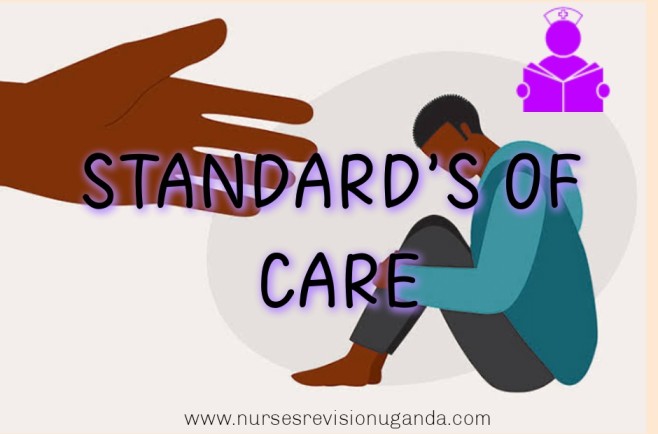Table of Contents
ToggleStandards of Care In Mental Health
Standards of Care are a means for improving the quality care for mentally ill people.
They were enunciated by the American Nurses Association (ANA) in 1973.
Development of Code of Ethics
This is very important for a psychiatric nurse as she takes up independent roles in psychotherapy, behavior therapy, cognitive therapy, individual therapy, group therapy, maintains patient’s confidentiality, protects his rights and acts as patient’s advocate.
Legal Aspects in Psychiatric Nursing
The practice of psychiatric nursing is influenced by law, particularly initial concern for the rights of patients and the quality of care they receive.
- The client’s right to refuse a particular treatment, protection from confinement, intentional torts, informed consent, confidentiality and Promotion of research in mental health nursing
- The nurse contributes to nursing and the mental health field through innovations in theory and practice and participation in research.
- Cost-effective nursing care. Studies need to be conducted to find out the viability in terms of cost involved in training a nurse and the quality of output in terms of nursing care rendered by her.
- Focus of care. A psychiatric nurse has to focus care on certain target groups like the elderly, children, women, youth, mentally retarded and chronic mentally ill.
- Record keeping are a few legal issues in which the nurse has to participate and gain quality knowledge.
STANDARDS OF MENTAL HEALTH NURSING
The purpose of Standards of Psychiatric and Mental Health Nursing practice is to fulfill the profession’s obligation to provide a means of improving the quality of care. The standards presented here are revision of the standards enunciated by the Division on Psychiatric and Mental Health Nursing Practice in 1973.
Professional Practice Standards
Standard I: Theory
The nurse applies appropriate theory that is scientifically sound as basis for decisions regarding nursing practice. Psychiatric and mental health nursing is characterized by the application of relevant theories to explain phenomena of concern to nurses and to provide a basis for intervention.
Standard II: Data Collection
The nurse continuously collects data that are comprehensive, accurate and systematic. Effective interviewing, behavioral observation, physical and mental health assessment enable the nurse to reach sound conclusions and plan appropriate interventions with the client.
Standard III: Diagnosis
The nurse utilizes nursing diagnosis and/or standard classification of mental disorders to express conclusions supported by recorded assessment data and current scientific premises.
Nursing logic basis for providing care rests on the recognition and identification of those actual or potential health problems that are within the scope of nursing practice.
Standard IV: Planning
The nurse develops a nursing care plan with specific goals and interventions delineating nursing actions unique to each client’s needs.
The nursing care plan is used to guide therapeutic intervention and effectively achieve the desired outcomes.
Standard V: Intervention
The nurse intervenes as guided by the nursing care plan to implement nursing actions that promote, maintain or restore physical and mental health, prevent illness and effect rehabilitation.
(a) Psychotherapeutic interventions
The nurse uses psychotherapeutic interventions to assist clients in regaining or improving their previous coping abilities and to prevent further disability.
(b) Health teaching
The nurse assists clients, families and groups to achieve satisfying and productive patterns of living through health teaching.
(c) Activities of daily living
The nurse uses the activities of daily living in a goal directed way to foster adequate self-care and physical and mental well-being of clients.
(d) Somatic therapies
The nurse uses knowledge of somatic therapies and applies related clinical skills in working with clients.
(e) Therapeutic environment
The nurse provides structures and maintains a therapeutic environment in collaboration with the client and other health care providers.
Standard VI: Evaluation
The nurse evaluates client responses to nursing actions in order to revise the database, nursing diagnosis and nursing care plan.
Professional Performance Standards
Standard VII: Peer Review.
The nurse participates in peer review and other means of evaluation to assure quality of nursing care provided for clients.
Standard VIII: Interdisciplinary Collaboration
The nurse collaborates with other health care providers in assessing, planning, implementing and evaluating programs and other mental health activities.
Standard IX: Utilization of Community Health Systems
The nurse participates with other members of the community in assessing, planning, implementing and evaluating mental health services and community systems that include the promotion of the brand continuum of primary, secondary and tertiary prevention of mental illness.
Standard X: Research
The nurse contributes to nursing and the mental health field through innovations in theory and practice and participation in research.


Thanks for this good work mentors so just asking how can I save this link to my phone
Just add it to your homescree.